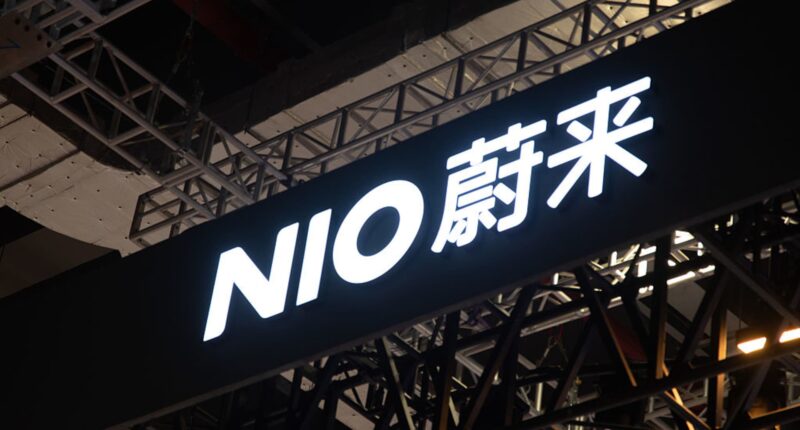Share this @internewscast.com
During the Shanghai Automobile Show 2025, the Nio logo prominently featured at the Nio booth within the National Exhibition Center in Shanghai, China, on April 28, 2025.
In a significant financial development, Nio’s shares listed in Hong Kong plummeted nearly 9% following a lawsuit filed by Singapore’s sovereign wealth fund, GIC. The lawsuit accuses the Chinese electric vehicle manufacturer of securities law violations, specifically for allegedly inflating its revenue figures.
Filed in the Southern District of New York court in August, the lawsuit names Nio’s CEO, Li Bin, and its former Chief Financial Officer, Feng Wei, as defendants. The allegations center around the company’s purported misrepresentation of revenue, particularly regarding leased battery income.
The complaint claims that Nio improperly recognized over $600 million in leased battery revenue through Weineng, a battery asset firm purportedly independent but actually controlled by Nio. The suit argues that Nio failed to disclose its stake in Weineng, thus misleading investors about the company’s financial health.
According to the lawsuit, Nio issued “materially false and misleading statements and omissions” that distorted the nature of its relationship with Weineng and misrepresented its actual revenue and earnings. This, the complaint asserts, led to an artificial inflation of Nio’s securities value.
Nio “issued materially false and misleading statements and omissions that misrepresented NIO’s relationship to Weineng and the Company’s true revenue and earnings figures,” which artificially inflated the value of Nio’s securities, the lawsuit stated.
As a result, GIC — which purchased shares of Nio between Aug. 11, 2020, and July 11, 2022 — suffered “tremendous losses,” according to the lawsuit.
Shares of Nio on the Singapore Exchange closed 9.5% lower.
CNBC reached out to GIC and Nio for comment but did not hear back.

Allegations of pulling forward revenue
Nio offers a battery subscription model, allowing customers to buy its car without a battery at a lower cost and lease the battery separately through a monthly subscription plan.
According to the lawsuit, Weineng was created to buy the leased batteries from Nio, so customers effectively leased them from Weineng.
The battery asset company was co-founded in 2020 by the defendants and three investors: Nio’s battery supplier CATL, Hubei Science Technology Investment Group, and a subsidiary of investment bank Guotai Junan International Holdings. Each investor held a 25% stake.
The complaint alleged that Nio had “a disproportionately larger economic interest in Weineng” than the other founders and controlled it as Weineng’s only source of revenue.
The arrangement, it said, allowed Nio to record years of subscription revenue upfront while removing depreciating battery assets from its balance sheet, in violation of securities laws. The company should have recognized the revenues in installments as customers paid for leases over time, the lawsuit argued.
It also claimed that Nio installed several of its own senior managers at Weineng to ensure that the affiliate acted in Nio’s interests.
Additionally, it argued that Nio should have consolidated Weineng’s revenues into its financial statements due to its controlling stake.
In 2022, short-selling firm Grizzly Research made similar claims, alleging that Nio had inflated revenue and boosted net income margins to meet targets.
“Instead of recognizing revenue over the life of the subscription (~7 years), Weineng allows NIO to recognize revenue from the batteries they sell immediately. Through this arrangement, we think NIO has juiced its numbers by pulling forward 7 years of revenue,” the report said.
GIC’s case against Nio is on hold after a judge ordered a temporary pause, according to an Oct. 3 court filing.
Correction: This story has been updated to reflect that GIC started purchasing Nio shares in 2020. The previous version misstated the year.






